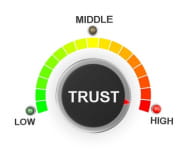Resolving Interpersonal Conflicts

Resolving interpersonal conflicts in the workplace is a healing process.If not immediately addressed it can have a negative impact on both morale and productivity.
Resolving interpersonal conflicts in the workplace is a healing process often utilized by management. However, it’s also a powerful tool that management doesn’t often make available to front-line workers. This can be a costly mistake. Interpersonal conflicts between co-workers, can escalate and lead to harmful and bitter repercussions. The resulting damage, if not immediately addressed, can have a negative impact on both morale and productivity.
The Issue of Interpersonal Conflict
In most organizations, management generally tries to encourage personnel to bring disputes to the notice of supervisory staff to mediate and resolve. Unfortunately, this usually doesn’t happen until the conflict has reached a near-critical stage.
The main reason is that most front-line workers won’t report interpersonal conflicts. They remain silent largely because they believe it would damage their reputations with their co-workers. They fear being labeled as squealers.
On the other hand, no one enjoys working in a workplace fraught with friction. The uninvolved personnel would like to see the issues resolved, but often remain silent. The reason is due to a lack of training on how to mediate disputes. If you were to take a poll of your workplace, it’s likely you’d learn that most employees prefer to resolve such disputes in-house, without management input.
How to Resolve Interpersonal Conflicts
The smartest way to deal with interpersonal conflict is to be proactive. This means you should act before a problem arises, and not just react after the damage has left its impact. So, how could this be done?
The answer is relatively simple.
First, choose an appropriate resolution dispute training model. This could be either through in-house training, or some other means, like providing mediation training such as a government-sponsored training program, college, or even by contracting a consultant. A basic course on mediation training should serve most of the commonplace interpersonal disputes that might occur within the workplace.
Second, have all the personnel in each individual unit meet amongst themselves. Here, they will choose a representative from their members, who will be trained to act as the facilitator to mediate disputes. At this point, management should also clearly state that this elected mediator will be responsible to advise their immediate supervisors of disputes that can’t be resolved. By making this clear to all employees, you release the nominated mediator from co-worker alienation. More importantly, this step allows management to become immediately aware of interpersonal issues before they escalate too far.
When Should Conflicts Be Handled by Management?
The nominated mediator shouldn’t handle all interpersonal disputes. This is particularly so when more serious disputes occur. Incidents such as physical altercations, threats, and bullying must be addressed by management. Mostly, however, the more extreme situations usually only arise when personnel leaves interpersonal disputes unattended where they will fester, infecting the workplace like a nasty sore.
By the time serious incidents have escalated to this point, the damage to both morale and productivity has already left its mark. People start to take sides. When the issue is finally dealt with by management, there is little that can be done to heal a dispute that has already spiraled well past the reason for the initial dispute in the first place.
In Sum
Implementing an interpersonal conflict resolution policy or process into your workplace is a win-win situation for everyone. The end result is a creative means that allows employees to iron out many of the common interpersonal differences amongst themselves. Secondly, management will see an increase in both the general goodwill and the overall harmony of the workplace.
Additionally, this process allows management the ability to immediately become aware of the more serious disputes, which personnel can now bring to their attention sooner rather than later. Finally, this process will help develop leadership skills amongst the rank and file, particularly amongst the mediators themselves. A happy workplace is obviously a more productive workplace, so why not take that extra step to make it so.
YOU MAY ALSO LIKE





I was dissatisfied when I used our company's mediation process because the co-worker whom I had the issue with would not committ to sitting down with both myself and the mediator; thus, it was a lose-lose situation.